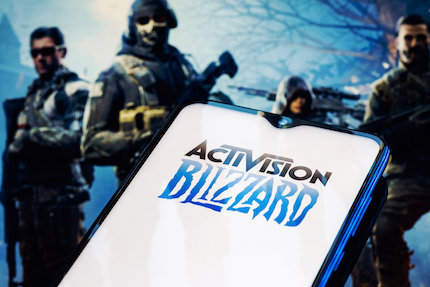There is no doubt now that Microsoft (MSFT) is a big believer that the future lies in the metaverse—and that the path to the metaverse runs through the video games industry.
If Microsoft is correct, its proposed $75 billion cash acquisition of Activision Blizzard (ATVI) may turn out to be the defining deal for the next era of consumer technology. It is already the largest gaming deal in history.

Activision is the company behind three billion-dollar franchises: Call of Duty, World of Warcraft,and Candy Crush.
Call of Duty dominates console gaming, with around 55% of all console gamers in English-speaking markets playing the game, according to Midia Research. Meanwhile, Candy Crush is one of the most successful mobile games. More than 270 million people play Candy Crush once a month or more and Candy Crush has been downloaded more than 2.7 billion times, according to Business of Apps.
The move is Microsoft’s biggest bet since CEO Sayta Nadella was appointed in 2014. The company is already the world’s largest software group, but the Activision deal will also make it the third-biggest gaming company in terms of revenues, behind only China’s Tencent (TCEHY) and Japan’s Sony (SONY).
The proposed deal would bring about 30 game studios under one roof and, in one fell swoop, promises to turn Microsoft into one of the biggest creators of interactive entertainment. Plus, the move could shake to the foundations the existing networks of alliances (and even rivalries) that shape the $200 billion global video games industry.
“Netflix for Gaming”?
The deal should not have come as a great shock.
Nadella dropped some hints, suggesting that Microsoft wants to build a “Netflix for gaming” platform—a subscription-based online service giving access to a wide array of exclusive content.
The company has already gone down that path. Its Game Pass video games subscription service grew almost 30% over the past year, to reach 25 million paying subscribers.
Activision would bring in a big new audience for Microsoft to tap. About 400 million people in 190 countries access one of Activision’s games online every month. And keep in mind that mobile games, like Candy Crush, are where the people are. The mobile market currently makes up more than 50% of gaming revenue worldwide.
However, we are in the very earliest innings of subscription services for video games. Juniper Research forecasts that, even by 2025, subscriptions will still only account for $11 billion in revenue for gaming companies. That’s a mere drop in the bucket when you consider the industry’s total sales already top $200 billion.
But Nadella isn’t deterred; instead, he continues thinking about the future and the part video games will play in it.
Consider Microsoft’s cloud business, Azure. With gaming shifting to a cloud service, data is now stored on external servers rather than on consoles.
In 2020, Activision signed a deal to make Google its preferred cloud provider and to use YouTube to stream its e-sports competitions. Obviously, Activision will switch its cloud provider from Google to Microsoft if the deal goes through.
Distributing games through the cloud could also give Microsoft a foothold in major new markets. For example, streaming through the Game Pass mobile platform will help Microsoft to tap new “global markets where traditional PC and console gaming has long been a challenge,” Nadella said.
And of course, there is the metaverse. Nadella believes games could be a key ingredient in creating the metaverse. He said, “Gaming is the most dynamic and exciting category in entertainment across all platforms today and will play a key role in the development of metaverse platforms.”
He added that, from this perspective, the virtual worlds of the future would look like “…a collection of communities and individual identities anchored in strong content franchises, accessible on every device.”
Does Microsoft Need Gaming?
What happens though if the Activision deal is blocked by government regulators? How important is gaming to Microsoft?
As Microsoft says, gaming is the fastest-growing sector in entertainment. Activision brings PC, mobile and console games, covering all gaming bases.
But for Microsoft, gaming remains a fairly small part of its overall business. In the past fiscal year, gaming revenue increased 33% to just over $15 billion, driven by growth in Xbox content and hardware sales. However, that was less than 9% of total revenue.
Microsoft’s $2.3 trillion market value was built on cloud computing and enterprise software—high growth, high margin markets.
So, it is almost hard to get excited about Microsoft’s gaming division, while the twin engines of Office 365 software and Azure services are powering along. Azure, the number-two cloud infrastructure business after Amazon’s AWS, is growing at 46%—faster than AWS’s growth. This suggests it is taking some of Amazon’s market share.
Microsoft’s latest quarterly results beat expectations nearly across the board.
Revenues of $51.7 billion were up 20% over the previous year. Sales growth this quarter is expected to remain high at up to 18%. And the Office 365 price increase should remind everyone of the margin power of software.
By comparison, we see the mere 6% rise in Activision Blizzard’s revenue in the past quarter. I’m sure Microsoft can improve the performance of Activision, which will help it in its move into the metaverse. But its other businesses, for now, will keep MSFT stock a buy in its $300 to $350 range.





